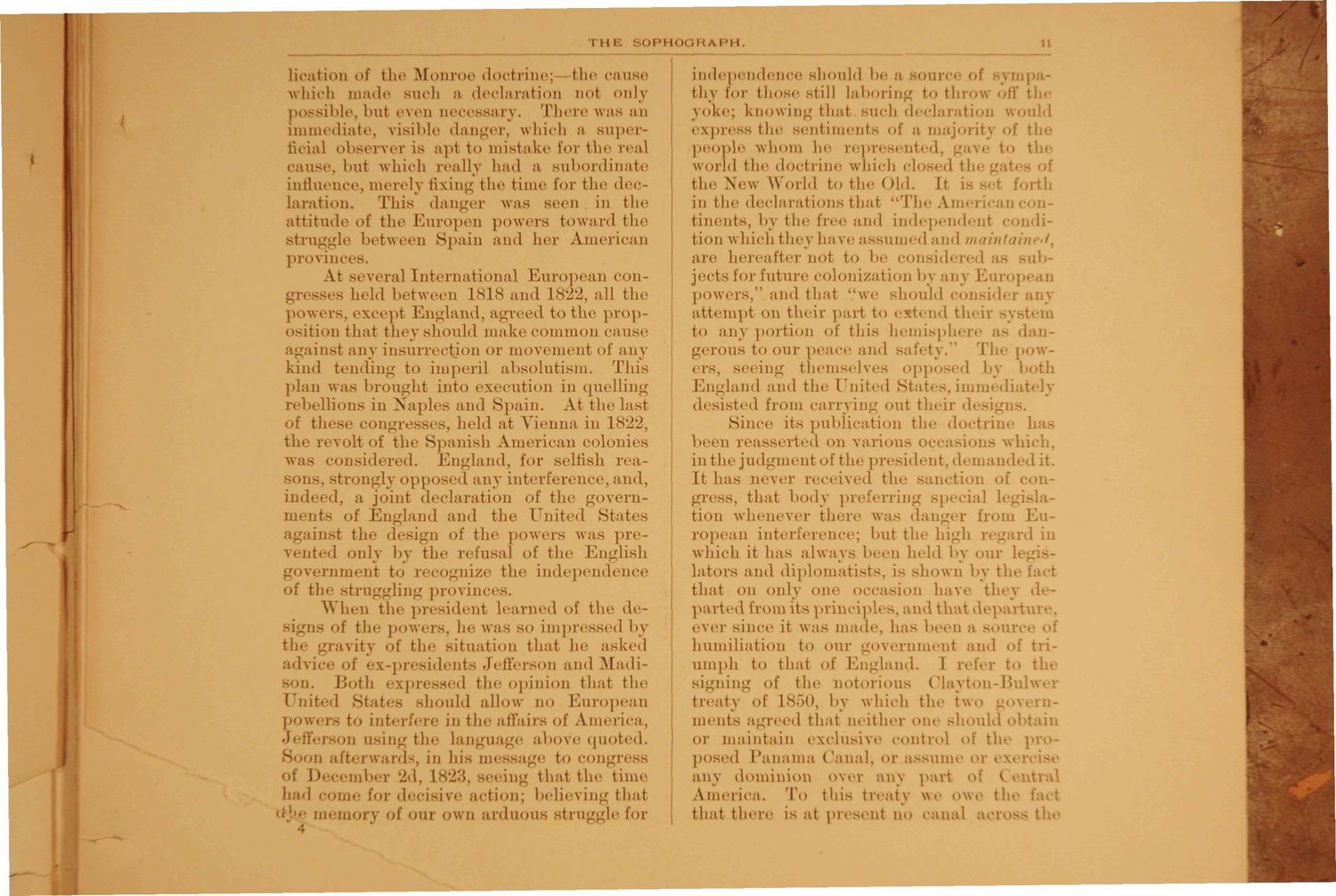Caption: Sophograph - 1891
This is a reduced-resolution page image for fast online browsing.

EXTRACTED TEXT FROM PAGE:
1 UK >P1 11 lication <>t' the Monroe doctrine;—the cause which made such a declaration Qoi only possible, but even necessary. There was an immediate, visible danger, which M super. ficial observer is apt to mistake for the real ran-.', but which really bad a subordinate influence, merely fixing the time for the declaration. This danger was seen in the attitude of the Europen powers toward the struggle between Spain and her American provinces. At several International European congresses held between 1818 and \*'2'2., all the powers, except England, agreed to the proposition that they should make common cause against any insurrection or movement of any kind tending to imperil absolutism. This plan was brought into execution in quelling r e b e l l i o n s in N a p l e s a n d S p a i n . At t h e last independ ice should be a ourc< of thy for those still laboring to tin r m\ • tin yoke; kn<»u ing that ach d itioc \press the sentiments of a maj< of eople whom be repr< ented, i I world tbe doclrine which <•! d th< the New World to the Old. It fo ill t h e d e e l a i a t i o n s t h a t ••lie A InQ- tinents, by the five and independenl tion which tbey h a \ e , • imed 8nd //< a re hereafter not to he considered p o w e r s , " a n d that "\vr should id conditin !»- jects for future colonization bj any Euro] attempt on their pari to extend thei to any portion of this bemispl dangerous to our peace and safety." Tl is. seeing tnemselvi opp i h England ami the United Stat- imn ly desisted from carrying out their designs. Since it> publication the d triie ]i > u reasserted on various occas hich in the judgment of the president lemandedii It has neve)- r» lived the nction ngress, that body preferring sj Lai I on whenever there was r from European interference; but the high i 1 in which it has always been held by our 1 « lators ami diplomatists, i shown by the : that on only or occasion have tiny departed from its principles, and that dep r s i n c e it w a s m a d e , h n >ur« S of these congresses, held at Vienna in 1822, the revolt of the Spanish American colonics was considei 1. England, for selfish reai >ns, strongly opposed any interference, and, iml< I. a joint declaration of the governments of England and tin' United States i ainst the design of t i c powers was prevented only by tin- refusal of the English { rnment to i :ognize tin- independence of the struggling provinces. W hen the president learned of tin- design*- of the powers, he was so iinpi d by ' tl ' gravity of tin- situation thai lie asked l\ic< .f ex-presidents Jefferson ami Madi>n. Both exp] d the opinion tbai tbe I'm" 1 States should allow no European era to interfere in the affairs of America, efl M using the language above quoted. I Soon afterwards, in his me* to congress of December 2d, L823 seeing thai the time bad come for d< isive action; believing that memory of our own arduous struggle for 4 humiliation to our government ami of triumph to that ni England. 1 signing of the notorious Clayton-Bidw< eatv of L850, by which the two nnients agreed that neither one should ol or maintain exclusive control pi posed Panama ('anal. assunu any dominion To Over this au\ tt\ S01l\ QO part fti i OWe 1 I the fiv SS t l America. that t here is at p
|